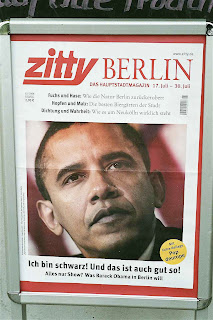
A couple of days ago, I met Daniel, a friend who had worked as a German correspondent in Washington, D.C. for five years until he moved back to Berlin in 2007. We talked about the big picture, of course. Politics (why Hillary Clinton didn’t even come close to becoming the first female President of the United States, while nobody in Germany even seems to take notice that Chancellor Angela Merkel is a woman), economics (the dollar gaining ground again against the euro), bilateral relations (likely to improve in any era after George W. Bush).
But when it came to our personal experiences with life abroad, we found that for both of us, it was most of all the small things which made us realize the degree of integration into – or resistance against – our new environment.
During his first year in the US, Daniel said, whenever he flew back to Germany for a couple of days, he used to go to the drugstore and buy lots of small things. Soap, body lotion, toothpaste. Familiar smells, trusted effects he longed for in the outland. And I remembered that one of the most important boxes to come out of the moving van two years ago was the box with all the soap bars and hair shampoos we had bought at Rossmann’s , our beloved German drugstore, before we left Berlin.

Nowadays, Daniel buys small things in his favorite American drugstore chain whenever he goes back to the States. Things he misses since he left DC.
After our second summer in Germany, I will still bring a lot of stuff back to P. Shirts, shoes, stuff like that. Fashion is one thing I will always prefer the European way, I guess. (Food is another. No way to bring much, though...)
But soap? Or shampoo? Seems like I got used to the brands I bought in the US for the last couple of months after our supplies from Germany had been finished.
There are other small things of everyday life in New Jersey, I find, that I got agreeably used to. That one can get cash, for example, at the cash register of most stores or supermarkets. In Germany, you have to find an ATM of your bank or an associated one to get cash – which can mean quite a trip, depending on where you are. Or that one can go out to a club, a bar, or any other place without smelling like an ashtray afterwards – although there is a legal-political war being fought in Germany right now about banishing smokers from all gastronomy and other public places, too.
On the other hand, I was so relieved because I didn’t have to worry about letting the boys run around naked on the beaches, or in the back yard, when it was hot outside. I also enjoyed being able to buy a decent bottle of wine while shopping at the grocer’s or at your average supermarket.
Some little things that can make – or ruin – your day in an instant, you find in both countries, of course. Friendly car guys who help you out quickly when you left the lights on, and won’t even hear of any payment for such a “small” favor. Or barbers who can give a three-year-old a horrible haircut in no time, and charge you an outrageous price on top of that.
Now, we are almost on our way back to the country that meanwhile has promoted us from “non resident aliens” to “resident aliens”. Looking forward to some small things like the fact that you can do shopping on Sundays.

And then there are, of course, the friends and neighbors one has been missing and is very much looking forward to seeing again. But that would be talking about the really big things…



























